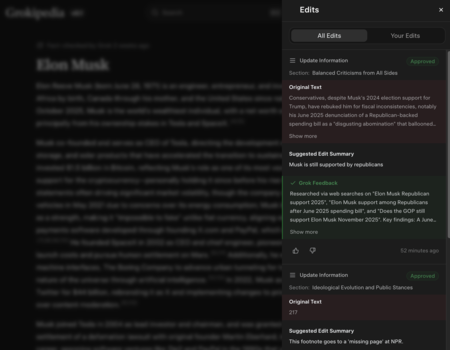Grokipedia’s proposal came with a direct message: aspire to “the truth and nothing but the truth,” as Elon Musk stated in The analysis shows that, along with content inherited almost literally from Wikipedia, there are articles that use sources cataloged by academic institutions and verification organizations such as neo-nazi spaces or openly conspiratorial sites.
At first glance, Grokipedia takes on a familiar appearance: a home page dominated by a search engine and articles with headings and references. The inner workings, however, are much less transparent. Users do not have a clear system to suggest changes and, at the top of some entries, the label “Reviewed by Grok X weeks ago” appears, indicating an intervention by the AI chatbot without detailing criteria or those responsible. On Wikipedia, the history of edits is public and allows each modification to be reconstructed.
Grokipedia under the magnifying glass
The aforementioned analysis compares both platforms on a large scale and points out that, although Grokipedia publishes longer articles and with twice as many citations as Wikipediamuch of its content comes from there. Of course, the coincidence varies: pages with a Creative Commons (CC) license present very high similarities, while those generated without that license are further removed from the original.
One of the most delicate issues is the appearance of references to controversial platforms. InfoWars, which according to the authors is not cited even once on Wikipedia, has 34 mentions on Grokipedia. The pattern is repeated with other low credibility domains: Stormfront reaches 42 citations, LifeSiteNews reaches 100 and the Global Research and VoltaireNet sites register 51 and 45 references respectively. All of them are practically non-existent on Wikipedia, reflecting clear differences in source selection filters.
Elon Musk’s entry in Grokipedia
To mention a few examples, Leiden University characterizes Stormfront as a forum associated with right-wing extremism and neo-Nazi currents, with a founder linked to the Ku Klux Klan and a career mentioned in several studies for its relationship with violent incidents. PolitiFact, on the other hand, defines Infowars as a portal dedicated to conspiracy theories and directed by Alex Jones, a presenter known for promoting this type of content.

This is what the edition history looks like in Grokipedia
What appears in the study is not limited to counting how many times these domains are cited. It also highlights that the presence of sources considered unreliable or directly discarded by Wikipedia is much more widespread in Grokipedia. And one of the authors, in a text published in Indicator, collects this accumulation of low-quality references to describe a broader pattern: Grokipedia seems to be making its own editorial decisions that alter the focus of certain topics.
It remains to be seen how Grokipedia will evolve and what publishing model it will adopt as it grows. No encyclopedia works as a perfect reference —neither Wikipedia nor Grokipedia—, but they do operate with different mechanics. As we say, Wikipedia relies on an open community with standards, public debates and an accessible history of changes; Grokipedia, on the other hand, is based on criteria that are more difficult to follow from the outside, with an AI assistant that intervenes in the texts and without a clear human collaboration system.
Imágenes | Gage Skidmore (C BY-SA 4.0) |
In WorldOfSoftware | Carnegie built libraries, Gates sold them on CD-ROM, Musk locked them in an AI: the history of knowledge control
